Opinion
Some posers to govt.
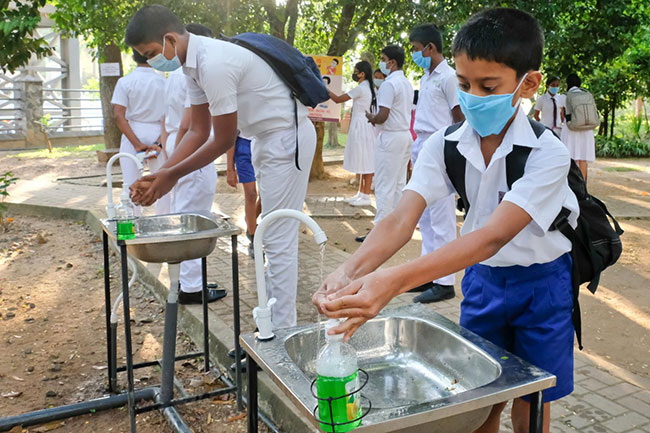
The long and scary wait is over. Wide-eyed and tentative Sri Lanka’s future is stepping out to go to school. For Sri Lanka’s children it has been nearly two long years of abnormal childhood. For their protection, they were locked downed, denied freedom, education, and physical contacts, friends, and some even experienced grief of losing parents or a loved one to the pandemic. Let’s hope they are not too scarred by the experience and the children’s natural resilience will come to their rescue. They could have started school earlier but for the irresponsible behaviour of the parents, which brought about lockdowns. Let’s hope lessons are learnt and they will behave responsibly this time in following health guidelines so the country will not have to be closed again.
What is in store for our children in schools when they return to school? Are the teachers ready with amended curriculums, or will the children be thrown into a vortex of a disorganised educational system, to pick up the threads by themselves. What preparations has the Education Ministry done to meet the new challenges brought about by the pandemic and school closures?
Students have forgotten what they learned and where they left off. They will have trouble understanding concepts. Are they to be driven by stick and ridicule as most teachers do? Or, are there any fresh/innovative guidelines? What about shortcomings in the online education? Did every child have access to it?
Shouldn’t there be a think tank or a task force to handle this unprecedented situation, to take stock, analyze, find ways and means of minimising the damage and may be even coming out of it stronger and better? It can be done with thinking out of the box with the right people in the right places taking informed, scientific and bold decisions. But seeing the poor revolting teachers on the streets and governments inactions, one is left with serious doubts about the younger generation’s chances of post pandemic recovery.
Citizen S
Opinion
Weaponising race
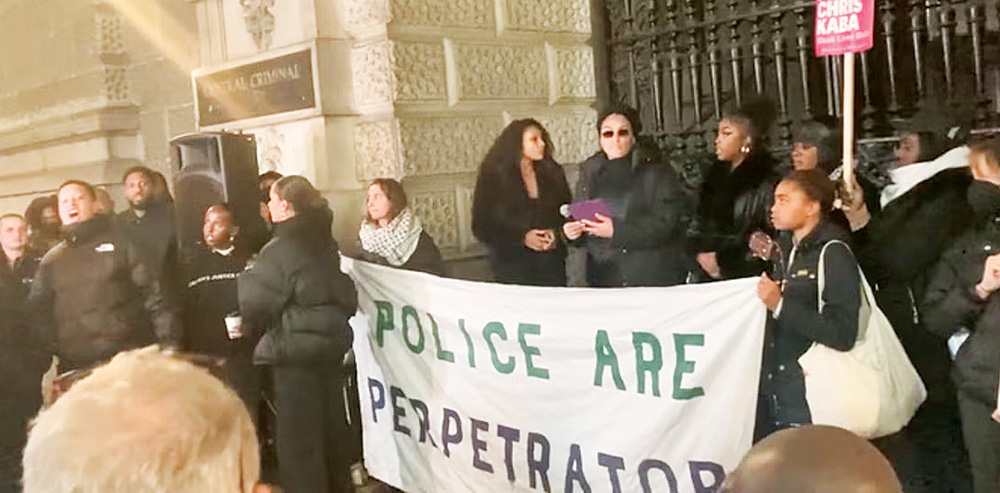
by Dr Upul Wijayawardhana
In the evening of 22 Sept., 2002, in Streatham Hill in south London, Metropolitan police in pursuit of a vehicle believed to be involved in a ‘firearm incident’ the previous day, cornered it but the driver attempted to speed away by ramming police vehicles, when an armed police officer fired a single shot through the windscreen. The injured young driver named Chris Kaba was admitted to hospital, but he died the following day. Police action appeared to be justified, but the driver happened to be black and no firearm was found in the vehicle or vicinity, there was a massive uproar, branding the incident as an instance of police brutality, with vigils displaying ‘Black Lives Matter’ signs.
Unlike in the US, the British police do not shoot at drivers of whatever colour and thought this was a rare incident, politicians including the former leader of the Labour Party Jeremy Corbyn readily joined the bandwagon of condemnation. The most significant amongst the politicians was the Labour Mayor of London, Sadique Khan, who has purview over the Metropolitan Police. Justifiably lamenting the loss of a young life, he said he understood “the grave concern and the impact of Chris’ death on Black Londoners across our city and the anger, pain and fear it has caused – as well as the desire for justice and change”. The implied blame without any investigations can only undermine the police but that is how politicians behave!
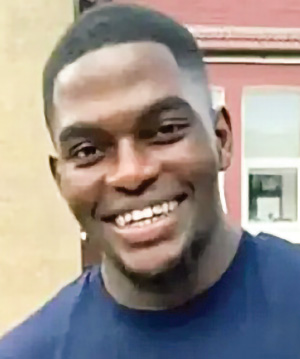
Chris Kaba
Whenever a death occurs due to police action or in police custody, it is mandatory in the UK for the incident to be reported to the Independent Office of Police Conduct (IOPC), this incident being no exception. After an investigation lasting seven months IOPC referred the case to the Director of Public Prosecutions (DPP) to decide whether the officer should be charged with murder. On 20 September 2023 the IOPC issued a press release which concluded with: “Following the completion of our investigation in March 2023, we referred a file of evidence to the CPS, who authorised the murder charge.” Firearm officers of the Met were very unhappy with this outcome, as they felt unprotected in performing their duties however unpleasant they may be, and over 100 officers handed back their firearms.
Charges were filed, when anonymity was lifted and the officer, Martyn Blake pleaded not guilty in March 2024, trial against him starting in Old Bailey on 02 October. After a trial lasting three weeks, a jury of six men and three women took only just over three hours to return the unanimous verdict of not guilty, much to the disappointment and annoyance of the family, who claimed that justice had not been served. Obviously, the jury believed the testimony of the police officer Martyn Blake that he had been compelled to shoot because he genuinely believed that the lives of his fellow officers were in danger as Chris Kaba, when boxed, reversed ramming his vehicle onto to a police vehicle and was attempting to drive away endangering their lives. His contention was that he felt Kaba was using the vehicle as a deadly weapon. Two other police officers testified that they had come to the same conclusion and were about to fire.
The BLM movement was furious with the verdict and its activists said: “No one can be safe while the police can kill with impunity. This verdict is not the end. It only strengthens our resolve. Now is the time to join and fight for a future where justice and accountability are the norm, and no-one is above the law.” A vigil attended by about 150 people was held outside the Old Bailey the same evening.
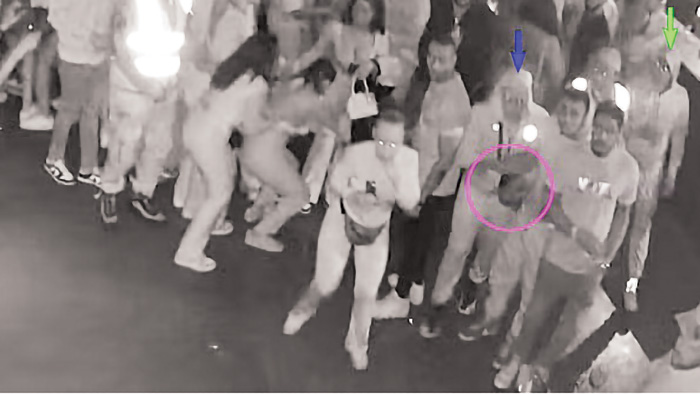
CCTV footage shows Kaba putting a handgun into his bag after shooting
a man in the thigh in a nightclub in London.
It was reported that Martyn Blake and family had to be taken to a safe house as numerous death threats have been received after the verdict. Metropolitan Police Commissioner Sir Mark Rowley, who was infuriated by the whole process, declared that Mr Blake had paid a huge personal and professional sacrifice in the two years since the shooting and that he had made “a split-second decision on what he believed was necessary to protect his colleagues and to protect London”. Whilst criticising the systems used to hold police officers who take lethal shots to account, he stated: “I worry about the lack of support officers face for doing their best, but most of all, I worry for the public. The more we crush the spirit of good officers, the less they can fight crime – that risks London becoming less safe.”
An interesting turn of events took place on 22 October, the day after the verdict, when the judge lifted restrictions on reporting the past of the victim, which had to be kept away from the jury. It appeared that Kaba had been a prominent member of a dangerous gang in London and was involved in a shooting a week before his death. Video footage released showed Kaba shooting another gang member, a rapper, in a London night club. Three other men have already been convicted over their involvement in this nightclub shooting and are serving long prison sentences. During their trial, Kaba was named by the presiding judge as the gunman, stating that Kaba shot the man once in the leg while on the nightclub dance floor, and once outside as the man tried to escape. Though Kaba died before being charged, he was later named on the charge sheet for that trial.
It transpired later that the family tried their best to prevent this information being released and they have been relatively quiet since. However, what is interesting is the response of politicians. The local MP, a Black lady, who was very critical of the police previously, stating that ‘campaigners are marching for justice for end to racism in policing’, toned down after the verdict stating, ‘Whilst police officers undeniably have a difficult job and work under exceptional pressures, this trial shows that nobody is above the law.’ However, the leader of a large trade union of teachers, who happens to be black, stated that Kaba got the second tier of justice! The most revealing comments come from the Mayor of London, who stated “There’s clearly still a wider lack of trust in the police, particularly within the black community, that needs to be addressed”. He said he was planning to hold the Metropolitan Police to account to ensure that lessons are learnt. Words of the head of the Metropolitan Police seem to have fallen on deaf ears! Sounds familiar: politicians would weaponise anything, race, religion being the commonest, for their advantage.
Whilst Israel, a state created on the basis of race, is massacring in Gaza, thousands of innocent civilians of a different race displaced due to its creation, world leaders turn a blind eye and a deaf ear. Whilst Sri Lanka is continuing to be harassed by the international community for the sin of militarily defeating a ruthless terrorist group, Israel’s fanciful explanations why it is killing so many innocents are readily accepted. What hypocrisy?
Opinion
The path of gifted child

by R N A de Silva
rnades@gmail.com
We often speak about the students who are struggling in mathematics classes with the hope of finding corrective measures to remedy the situation. But rarely we consider what needs to be done to help gifted students. Even in teacher forums and parent-teacher meetings the discussions are directed towards students who have difficulties in mathematics. Perhaps this is due to the fact that those who struggle with mathematical problem solving are in a majority group. But, is it fair to forget about the needs of gifted children although they may be only a handful in number?
Most educational settings do not adequately address the needs of gifted students due to the difficulties to administer a specialised programme as it involves structural changes in a rigidly followed curriculum. Ultimately it is left to the teacher to identify such students and to provide accelerated learning situations and enrichment activities within a regular classroom setting. This causes a problem as some teachers may not have the required knowledge and capability to handle the situation successfully.
A gifted child is defined as ‘a child who is naturally endowed with a high degree of mental ability in a specific sphere of activity or knowledge’. Identification of a gifted child cannot happen solely on high achievement levels. If a child scores very high on a particular test it maybe that the test was not of appropriate difficulty. Therefore, the score may not indicate the true level of understanding. In such a situation it may be necessary to administer an assessment of a higher standard. In addition, general performance, teacher observations and social & emotional behavioural patterns have to be looked at for a formal evaluation. The common characteristics of a gifted child include ability to comprehend material several grades above their age level, strong sense of curiosity, creative problem solving and imaginative expression and absorbing information quickly with few or no repetitions.
Mathematically gifted students are often able to work out solutions with unusual speed and accuracy. They are able to see relationships and connections without formal instruction. As such, they may show signs of boredom and disinterest when the teacher tries to demonstrate the steps required to obtain the correct answer in detail. They usually are more interested in finding out how a formula is formed and why it is done in a particular way rather than the computational processes involved with the formula. Further, these children prefer to learn all they can about the concept introduced before moving on to the next topic perhaps creating difficulties for the teacher who has to consider time constraints and schedule structure.
For a teacher, managing a range of academic levels within a classroom is a formidable task. If the gifted learners are underchallenged or unstimulated, there can be a discrepancy between how these children prefer to learn and how they are taught. As a result, there can be behavioural problems, confidence breakdown and even peer relationship clashes. As an example, Steve Jobs, the founder of Apple technology had difficulty functioning in a traditional classroom, frequently misbehaved and was suspended a few times, perhaps because his brilliant mind was not challenged sufficiently during classes. On the other hand Carl F. Gauss, the renowned German mathematician was identified by his teachers as a person with extraordinary mathematical skills and sent to a specialised mathematical academy for further study. Similarly, the Indian mathematical prodigy Ramanujan was identified as a mathematical genius by Professor Hardy of the University of Cambridge, and because of that Ramanujan was able to contribute so much towards mathematical analysis and number theory. Professor Hardy is a genius in recognising a genius and if not for him we may never have heard of a Ramanujan.
An annoyance that teachers experience is when gifted children obtain solutions to given problems through non-traditional methods or when their questions go far beyond the scope of the stated content in the syllabus. These students may have the ability to analyse mathematical situations correctly and obtain solutions to problems faster than their teachers. Capable teachers may use a different instructional approach in such situations adapting their teaching strategies to accommodate the needs of such students. Inexperienced teachers may give further exercises to these students not realising that what they need is not ‘quantity’ but ‘quality’.
In a nurturing learning environment, an atmosphere of mutual respect and appreciation is created between students and teachers. All students should feel valued. If some of them show capabilities ahead of their age, the educators have a responsibility to strengthen these talents so that they can develop their potential to the fullest. There are three ways of educating children who are intellectually and academically more advanced than their peers.
Acceleration – The gifted child is allowed to learn material at a more rapid pace. Intellectually gifted children, too, may have learning disabilities. They may be gifted in one area and not in another. Help students immerse themselves in a subject that sparks their passion. Self-directed learning is a skill that can be developed with all students but more so with gifted children.
Enrichment – The child works through the usual pace but supplemented with diverse activities and explorations. Students’ curiosity needs to be respected and encouraged. Space for deeper exploration and understanding can be provided through enrichment activities.
Differentiation – Both acceleration and enrichment described above are carried out within the regular classroom setting.
Teachers will be able to set more realistic expectations within a classroom setting if they are sensitive of the unique characteristics of mathematically gifted children. In order to accept the divergent thinking abilities of the gifted students, teachers have to be confident of their knowledge and teaching ability. If the students arrive at the correct solutions through unusual but creative methods, the teachers should acknowledge and reward them appropriately. Once the giftedness is identified, teachers could adapt the content and alter the pace of content acquisition giving room for more open-ended problems. The following are a few suggestions for parents and teachers when dealing with gifted children.
Provide opportunities to express their feelings
Giftedness is closely associated with sensitivity. As they often experience intense emotions, if not managed, it can result in disruptive behaviour. It is important to set aside some time preferably on a daily basis for them to share their concerns with parents. Listen to what they have to say without any dismissive comments.
Do not compare them with other children
Very intelligent children usually are self-critical. Encourage them to strive for success without being competitive. Show them that they have your support to reach their goals.
Do not place undue emphasis on grades.
Praise their strengths and at the same time indicating that nobody can be good at everything that they do. Discuss manageable strategies to strengthen areas of weakness. Unnecessary anxiety may creep in if the emphasis is placed on grades.
Support their involvement in extra-curricular and social activities.
Gifted children have a tendency to lead very busy lives. Help them to select realistic commitments covering a range of activities including their passionate interests, making sure that there is time to play, socialise and relaxation. Creative hobbies, too, can serve as a valuable tool to bring out their imaginative power.
As Ellen Winner quoted “Every child deserves a chance to succeed, but gifted children need it more urgently”.
The author is an educational consultant at the Overseas School of Colombo and a senior examiner of the International Baccalaureate Organization in UK.
Opinion
Lawyers’ Collective calls on govt., all political parties to commit to repeal of PTA
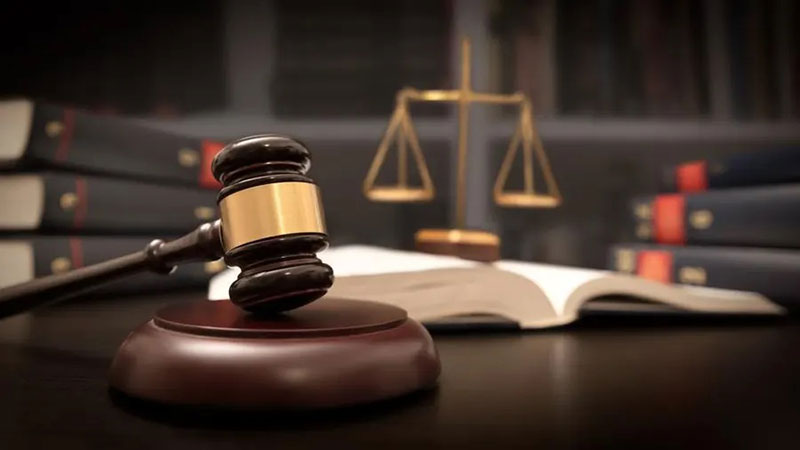
On 29 October 2024, the Director-General (Legal) at the Presidential Secretariat, Attorney at Law J M Wijebandara, representing the government stated that the issue was not the PTA’s existence as our law, but rather its misuse to detain civil activists, journalists, and others. He stated that the Government would not allow such misuse and that the PTA would only be applied based on “credible intelligence information, and it will not be used for political revenge”. On the same day, Cabinet Spokesman Minister Vijitha Herath stated: “There is a discussion on abolishing the PTA. We can only talk about changing the Act when the new Parliament is elected.” The Lawyers’ Collective expresses its grave concern regarding statements indicating that the PTA will be retained.
The National People’s Power (NPP), in its Election Manifesto of August 2024, commits to the “Abolition of all oppressive acts including the Prevention of Terrorism Act (PTA) and ensuring civil rights of people in all parts of the country” (p.129). During the recent presidential election campaign, and even before, the NPP actively advocated against the PTA and the abuse of its powers and has also opposed new laws that are similarly oppressive. It is of serious concern therefore, that after the people endorsed a mandate to repeal the PTA at the recent Presidential elections, the recent statements of the NPP government undermine the commitment made to the people.
The PTA, enacted in 1979, is well known as a draconian piece of legislation with broad emergency-like executive powers, but enacted for use in ordinary times as well. The provisions and scheme of the PTA fail to protect fundamental rights such as freedom from arbitrary arrest, freedom from torture and freedom of expression. The PTA, as implemented by successive governments since its enactment, has caused unmeasurable human suffering in the form of torture, long-term detentions and instilling fear in minorities and those critiquing the government. The PTA has a record of being used as a weapon and continue to be used against any citizen with impunity. The call for its repeal has been resounding from within the country as well as internationally. There has been wide support for its repeal by political parties in recent years, but successive governments have continued to retain it after taking office.
President Anura Kumara Dissanayake must honour the commitment to repeal the PTA. The statement made on behalf of the government by Director General (Legal), Presidential Secretariat, J M Wijebandara must be unequivocally clarified, and a clear commitment to repealing the PTA be made public. This clarity and leadership are necessary to build public confidence that the government stands for the repeal of the PTA.
The Lawyers’ Collective also calls on all political parties to commit to multi-partisan support in the next Parliament to repeal the PTA. Parties must commit to ensure that Sri Lanka’s counter-terrorism legal framework complies with human rights safeguards. If emergency measures are needed in a given situation, all emergency powers must be strictly confined to periods of a declared state of emergency. These measures will strengthen the rule of law, democracy and human rights in the country and in turn, boost confidence in governance.
On behalf of the Lawyers’ Collective
Upul Jayasuriya, President’s Counsel
Dr. Jayampathy Wickramaratne, President’s Counsel
Professor Savitri Goonesekere, Attorney-at-Law
Geoffrey Alagaratnam, President’s Counsel
M.A. Sumanthiran, President’s Counsel
Saliya Pieris, President’s Counsel
M.M. Zuhair, President’s Counsel
S.T. Jayanaga, President’s Counsel
Professor Deepika Udagama
Professor Camena Gunaratne
Rev. Fr. Noel Dias, Attorney-at-Law
Srinath Perera, Attorney-at-law
Ermiza Tegal, Attorney-at-Law
Sandamal Rajapakse, Attorney-at-Law
Manoj Nanayakkara, Attorney-at-Law
Amila Egodamahawatte, Attorney-at-Law
Jayantha Dehiaththage,Attorney-at-Law
-

 Business4 days ago
Business4 days agoStandard Chartered appoints Harini Jayaweera as Chief Compliance Officer
-
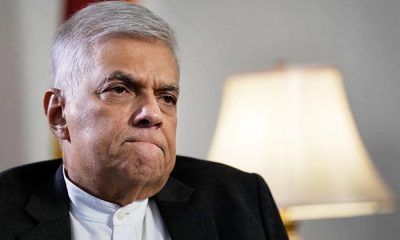
 News5 days ago
News5 days agoWickremesinghe defends former presidents’ privileges
-
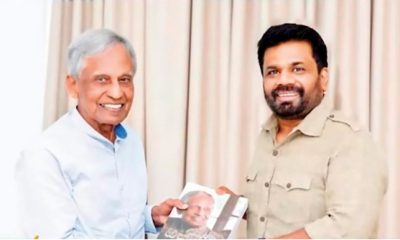
 Opinion5 days ago
Opinion5 days agoDevolution and Comrade Anura
-

 News3 days ago
News3 days agoFive-star hotels stop serving pork products
-

 News3 days ago
News3 days agoFifteen heads of Sri Lanka missions overseas urgently recalled
-

 Sports5 days ago
Sports5 days agoChamika, Anuka shine as Mahanama beat Nalanda
-
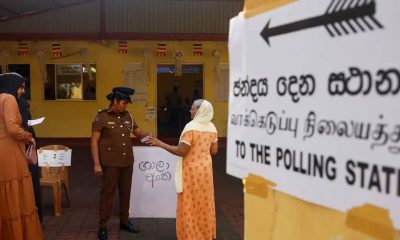
 Features3 days ago
Features3 days agoWaiting for a Democratic Opposition
-
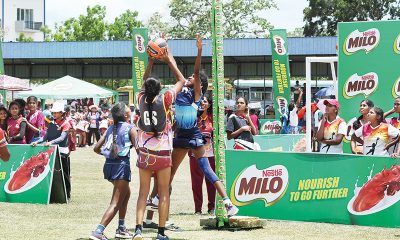
 Sports5 days ago
Sports5 days agoMilo powered Schools Netball finals from November 4











